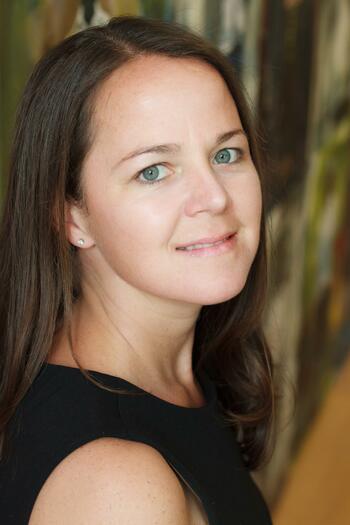Cervical cancer is the cause of 1.3% of all new female cancers and 1.1% of female cancer deaths, according to Canada’s Public Health statistics.
First Nations, Inuit, and Metis women die from cervical cancer at 4 times the rate of the general population, driven by lack of access to screening in their communities. The pandemic has only worsened this inequity.

Photo courtesy of Dr. Yeates.
WEMA Inc. and Queen’s researcher Karen Yeates are aiming to make the screening process more accessible to women, especially in remote communities, via a novel cervical cancer screening service.
WEMA, which stands for Women’s Health Equity through Mobile Approaches, is a Canadian Not-For-Profit Corporation, based in Kingston Ontario, co-founded by Queen’s University Professor Karen Yeates. Dr. Yeates is a clinician-scientist with a global health research focus in mobile health (mHealth) and how it can improve access to prevention, detection and treatment for non-communicable diseases, and access to reproductive health services. Dr. Yeates is also a co-founder and previous co-director of the Queen’s University School of Medicine Office of Global Health, and is a graduate of Queen’s Medical School.
“After working with cervical cancer prevention experts in Tanzania, East Africa, I wanted to develop and evaluate a method using a smartphone that could improve the training and increase scale-up of the cervical cancer screening method currently used in most low-income countries,” says Dr. Yeates. “For the last decade, frontline nurses have been trained to visually inspect a cervix after applying vinegar. This method, known as Visual Inspection under Acetic Acid or VIA, allows them to visualize a pre-cancerous lesion that, if found early, could be easily treated by applying C02 gas or a thermal ablation probe to it for five minutes,” explains Dr. Yeates about the development of SEVIA (Smartphone Enhanced Visual Assessment), one of the first offerings from WEMA. “I thought that if we could train the nurses remotely using a smartphone-based program, then we could scale up the program in even the most remote village and this is what we did.”
Virtual screening will rapidly increase access and accuracy of cervical cancer screening. SEVIA focuses on the delivery of an integrated training model to provide superior cervical cancer screening services, treatment of small and large lesions, and support and monitoring of the program with partners. SEVIA is the platform for a remote physician or expert cervical cancer screening nurse, located in Tanzania or even in another country, to provide guidance and training (peer-decision support) for accurate VIA diagnosis. SEVIA enables accurate diagnosis and treatment in a woman’s home, thereby eliminating the need for most women to receive higher quality screening services and reducing the need for women travel to clinics that may be a long distance from their home.
“More than 2 million women in Ontario live in rural and remote communities-and the remotest communities are First Nations communities – this will be our starting point but as new guidelines for cervical cancer prevention come into play, including primary care-based testing for HPV DNA among women at risk, SEVIA could become a solution for virtual cervical cancer screening for any woman at risk in Ontario, Canada, and most of the world,” says Dr. Yeates.
Recently, Dr. Yeates and her Queen’s-based team had the opportunity to participate in the Falcons’ Fortunes pitch competition hosted by FACIT, a commercialization venture firm that builds companies with entrepreneurs to accelerate oncology innovations.
“We heard about the FACIT pitch competition through our interactions with Shoma Sinha at Queen’s Partnerships and Innovation,” says Dr. Yeates. “We are also grateful for the pre-pitch review and coaching as we prepared for the event.”
Now in its 9th year, FACIT hosts the annual pitch competition to celebrate Ontario’s life sciences and entrepreneurial culture, as well as highlight emerging innovations. The competition is supported through FACIT’s strategic partner, the Ontario Institute for Cancer Research, which receives funding support from the Government of Ontario. This year’s final pitch competition featured 6 of the most promising oncology-related innovations from across Ontario, and WEMA was awarded the Audience Choice Award. This is great news for the founding team.
“As a result of our participation in the FACIT Falcons’ Fortunes pitch competition, we were able to bring awareness to our platform and how we are working toward more accessible cervical cancer screening in Ontario and/or to women who live in rural and remote regions across Canada. The visibility to important parties in the life sciences community can really help us to make connections and find the right avenues to bring this project forward,” says Dr. Yeates.
WEMA has been perfecting SEVIA for a decade in Africa through funding from many research partners, with the highest funding from Grand Challenges Canada, and continues to improve screening services for women in Tanzania. The SEVIA program is integrated with the national cervical cancer prevention program and aligns with the mCervical approaches endorsed by the WHO. WEMA has a committed and global team that includes scientists, software developers, African and Canadian cervical cancer prevention experts, as well as software development and AI experts at Queen’s Center for Advanced Computing, and at the U.S National Institutes of Health. And they have big plans for the future.
“Given the affordability of our solution and very few competitors, we think SEVIA can help to eliminate cervical cancer globally by 2030!” says Dr. Yeates.
 Research at Queen's
Research at Queen's